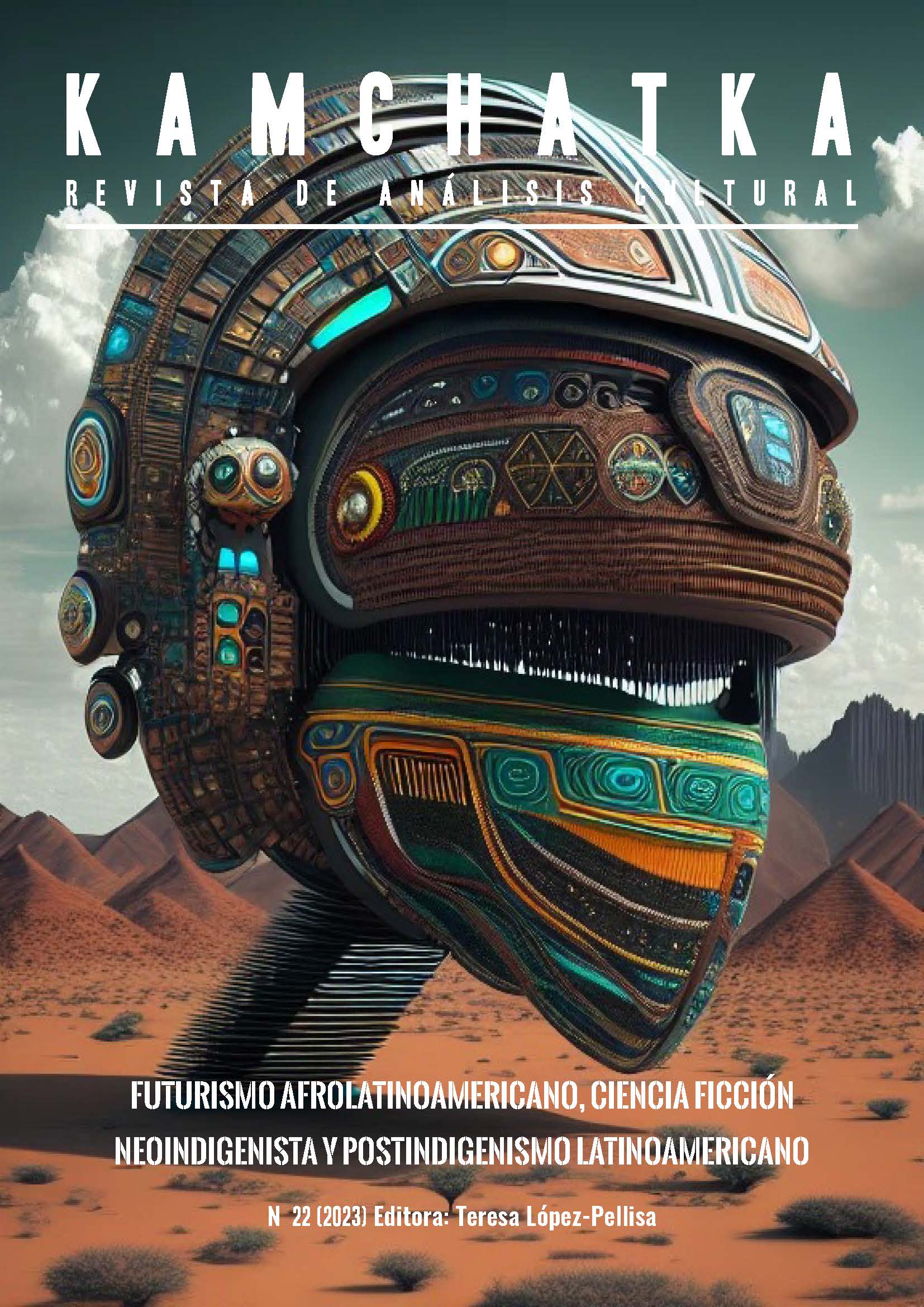Remains, traces and Memories in Cristina Rivera Garza’s El invencible verano de Liliana
DOI:
https://doi.org/10.7203/KAM.22.26438Keywords:
Memory, Femicide, Affects, Feminism Abstract
Abstract
This article analyzes how Cristina Rivera Garza builds memory around the femicide of her sister in El invencible verano de Liliana (2021). It starts from observing that, when working deeply with memories from the present, the cultural frameworks from past experiences are reconfigured providing the tools and language that affect the way memories are recalled. In this sense, the language and perspective that both theoretical and activist feminisms bring to Rivera Garza trigger memories from a different situationality. Then, the article proposes that Rivera Garza’s journey allows her to link research and montage tasks with the mobilization of affects and memories. Thus, she is configuring another archive, a mobile and multidimensional map-plan that traces connections from the past to the present. Through this archive, it is possible to reflect on the past with current tools and construct a dynamic memory that challenges its readers, also activating them. The dynamism that she advocates for, from a work that is difficult to categorize in a particular genre, is part of its political dimension.
 Downloads
Downloads
 References
References
Ahmed, Sara. (2010). “Happy Objects”. Gregg, Melissa y Seigworth, Gregory J. (eds.). The affect theory reader. Durham, NC: Duke University Press: 29-51.
Ahmed, Sara. (2014). La política cultural de las emociones. México: Universidad Nacional Autónoma de México.
Alvarado, Mariana, Fischetti, Natalia y Fernández Hazan, Valeria. (2020). “Epistemologías feministas: conversaciones (in)interrumpidas”.
Alvarado, Mariana (ed.). Feminismos del Sur. Recorridos / Itinerarios / Junturas. Ciudad Autónoma de Buenos Aires: Prometeo Libros: 17-40.
Assmann, Jan. (2010). “Introducción a la Memoria. ¿Qué es la memoria?”. Assmann, Jan (ed.). Religión y memoria cultural. Buenos Aires: Lilmod/ Libros de la Araucana: 17-50.
Barrientos, Panchiba F. (2021). “Decir feminismo no (es) solo hoy. Algunas reflexiones sobre tiempos, tensiones y preguntas para pensarnos desde y con la historia”. Gávez Comandini, Ana (ed.). Históricas. Movimientos feministas y de mujeres en Chile, 1850-2020. Santiago: LOM Ediciones: 129-144.
Cruz Arzábal, Roberto (ed.). (2019a). Aquí se esconde un paréntesis: Lecturas críticas a la obra de Cristina Rivera Garza. México: UNAM.
Cruz Arzábal, Roberto. (2019b). “Introducción”. Cruz Arzábal, Roberto (ed.). Aquí se esconde un paréntesis: Lecturas críticas a la obra de Cristina Rivera Garza. México: UNAM: 13-23.
Derrida, Jacques. (1997). Mal de archivo. Una impresión freudiana. Madrid: Trotta.
Didi-Huberman, Georges. (2015). Ante el tiempo: historia del arte y anacronismo de las imágenes. Buenos Aires: Adriana Hidalgo.
Guillén, Beatriz. (2022, noviembre 25). “Radiografía de un país que mata a sus mujeres: 17.776 asesinadas en cinco años”. El País México.
Jelin, Elizabeth. (2002). Los trabajos de la memoria. Madrid: Siglo XXI Editores.
Macón, Cecilia. “Sentimus Ergo Sumus. El surgimiento del ‘giro afectivo’ y su impacto sobre la filosofía política”. Revista Latinoamericana de Filosofía Política 6 (2013): 1-32.
Macón, Cecilia. “‘Mapas afectivos’: el MUME y el Parque de la Memoria como matrices críticas para la representación artística del pasado”. Clepsidra. Revista Interdisciplinaria de Estudios sobre Memoria 6 (2016): 10-27.
Negrete Sandoval, Julia Érika. (2019). “La escritura en la narrativa de Cristina Rivera Garza: hurtos, apropiaciones, trazos de la otredad textual”. Cruz Arzábal, Roberto (ed.). Aquí se esconde un paréntesis: Lecturas críticas a la obra de Cristina Rivera Garza México: Universidad Nacional Autónoma de México: 111-136.
OCNFeminicidioMX. (2021, febrero 24). “Violencia contra las Mujeres en México | Informe del OCNF, CDD y REDTDT al Comité CEDAW”. OCNF.
Olaizola, Andrés. “Las escrituras geológicas de Cristina Rivera Garza”. Boca de sapo 33 (2022): 84-93.
Podalsky, Laura. (2021). “El giro afectivo”. Poblete, Juan. (ed.). Nuevos Acercamientos a Los Estudios Latinoamericanos. Cultura y Poder. Buenos Aires / México: CLACSO / UNAM: 411–439.
Pollock, Griselda. (2007). “Diferenciando: el encuentro del feminismo con el canon”. Cordero Reiman, Karen y Sáenz, Inda (eds.). Crítica feminista en la teoría e historia del arte. México: Universidad Iberoamericana / PUEG-UNAM / CONACULTA / FONCA / CURAR: 141-158.
Quijano Velasco, Mónica. (2019). “Presentación”. Cruz Arzábal, Roberto (ed.). Aquí se esconde un paréntesis: Lectruas críticas a la obra de Cristina Rivera Garza. México: UNAM: 7-11.
Richard, Nelly. “La crítica feminista como modelo de crítica cultural”. Debate Feminista 40 (2009): 75-85.
Rivera Garza, Cristina. (2013/2019). Los muertos indóciles. Necroescrituras y desapropiación. México: Penguin Random House.
Rivera Garza, Cristina. (2021). El invencible verano de Liliana. México: Random House.
Rivera Garza, Cristina. (2023). “The Breath Archives: Affective Documents, Collective Memory, and the Afterlives of Femicide”. Conferencia presentada en The American Academy in Berlin, 4 Mayo.
Silverstein, Stephen. “Ragpickers of Modernity: Cristina Rivera Garza’s Nadie me verá llorar and Walter Benjamin’s Theses on the Philosophy of History”. Revista de Estudios Hispánicos 47 (2013): 533–559.
Solana, Mariela. “Afectos y emociones, ¿una distinción útil?” Diferencia(s). Revista de teoría social contemporáena 10 (2020): 29-40.
Solana, Mariela, y Vacarezza, Nayla Luz. (2020). “Sentimientos feministas”. Revista Estudios Feministas 2 (2020): 1-15.
Downloads
Published
How to Cite
-
Abstract1287
-
Artículo PDF (Español)663
Issue
Section
License
This journal provides an immediate free access to the content on the principle that freely make investigation available to the public, which promotes an increased global knowledge exchange.
Unless otherwise indicated, texts published in this journal are under the license Attribution-NonComercial 4.0 by Creative Commons. These texts may be copied, distributed and publicly communicated whenever the publication’s author and title are quoted and whenever they are not used for commercial purposes. In any case, intellectual property of the articles and its potential economic rights entirely belong to its authors.
The full license can be consulted on https://creativecommons.org/licenses/by-nc/4.0/. We encourage authors to disseminate papers published in Kamchatka. Journal of cultural analysis electronically, in institutional digital repository or in their websites.





